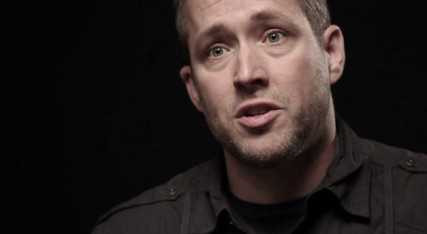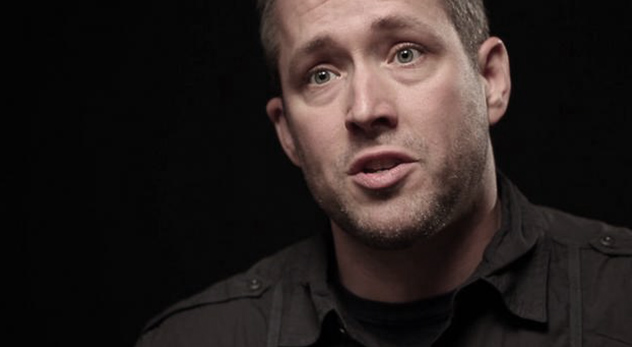Note: Each Friday, “On Faith & Culture” will feature an exclusive interview with a Christian thought leader or a voice of importance to the American Christian community.

J.D. Greear pastors one of the fastest growing churches in America, but his new book promises to rattle some Christians’ cages.
Thirty-nine-year-old J.D. Greear pastors The Summit Church in Durham, N.C., which has been named one of the top 25 fast-growing churches in America for several years by Outreach magazine. Here Greear discusses his new book, Stop Asking Jesus Into Your Heart (B&H Publishing, February 2013), which unpacks the sticky questions of surrounding Christian salvation and the sometimes-misleading presentation of it in the church today.
JM: Author and pastor David Platt drew much controversy when he called the sinner’s prayer “superstitious” and “unbiblical.” Do you agree with that perspective?
JG: For what it’s worth, I think David’s words have been taken out of context. What David meant was that securing salvation has become for many evangelicals something like a Protestant ritual or sacrament, which if you do correctly punches your ticket.
But God never promises to give salvation in response to a prayer or because you went through a ceremony at the altar of your church. God gives salvation to those who repent and believe the gospel. The prayer is only good insofar as it expresses repentance and faith. Belief in the finished work of Christ is in itself a cry to God for salvation. You can repent and believe without “praying the prayer,” per se, and you can pray the prayer without being in the posture. Salvation comes by surrendering to Christ’s lordship and believing in his finished work, whether or not you pray a prayer “asking Jesus into your heart.”
JM: In the same vein, does praying the sinner’s prayer give false assurance of salvation? Do you think those who do it should take a second look and question whether they’re really saved?
JG: My main thesis in this book is that reducing salvation to a sinner’s prayer gives assurance to some who shouldn’t have it, and keeps assurance from some who should. I am not trying to say that the sinner’s prayer is wrong in itself—after all, as I mentioned above, salvation is essentially a cry for mercy to God: “God, be merciful to me, a sinner” (Luke 18:13). I’m not even against the language of asking Jesus into your heart, because—if understood correctly—this is a biblical concept (cf. Rom. 8:9–11; Gal. 2:20; Eph. 3:17).
I am saying that the sinner’s prayer has become a cliché, a ritual that people often go through without considering what stands behind the ritual. Shorthand phrases for the gospel can serve a good purpose—as long as everyone knows what the clichés mean. It is obvious, however, that in the case of the sinner’s prayer, most people don’t anymore. Surveys show that more than 50% of people in the U.S. have prayed a sinner’s prayer and think they’re going to heaven because of it, even though there is no detectable difference in their lifestyles from those outside of the church.
Thus, since so many people are assured of salvation simply because they “prayed a prayer”–despite lives that argue to the contrary–I believe it is time to put the shorthand aside. We need to preach salvation by repentance before God and faith in the finished work of Christ. At the very least, when inviting people to pray the prayer, as I often do, we need to be careful to explain exactly what we mean.
JM: On the flipside, why do many Christians lack assurance of their faith, even when they’ve followed the prescribed steps taught in their faith communities?
JG: Because we have reduced conversion to a ceremonial prayer, many Christians are obsessed over whether they did it right: “Was I really sorry enough?” “Was that prayer a moment of total surrender?” “Did I understand enough about grace?” Many of those people secretly pray the prayer again and again. They feel better for a little while, but then the questions come back. Rinse and repeat. I know, I went through that 1000 times as a teenager. I was even baptized on four separate occasions.
Conversion is not a ceremony you go through but a posture of repentance and faith that you assume. The posture does indeed begin in a moment, but it continues for a lifetime. Salvation happens in a moment: I don’t want to confuse or downplay that. But in that moment, you merely enter a posture of submission to the lordship of Christ and trust in his finished work. That is a posture you maintain for the rest of your life. And the way you know you made the decision to get into that posture is that you are there now.
In other words, assurance of salvation comes not from being able to remember with clarity the moment that you got into the posture, but by the fact that you are in that posture now. “Believe” in the Bible, as it relates to assurance, is almost always in the present tense. We don’t find assurance from remembering when we first believed, but by knowing that we believe now.
Here’s another way to think about it: if you are seated right now, there was a point in time in which you transferred the weight of your body from your legs to the chair. You may not even remember making that decision, but the fact that you are seated now proves that you did. Your present posture is better proof than a past memory.
JM: What hope do you offer to readers who are seeking assurance of salvation?
JG: Assurance of salvation comes from properly understanding the gospel. The good news is that God wants you to know. Many people think that God does not want us to have assurance of salvation, as if uncertainty is a kind of carrot that he holds out in front of us to keep us acting right. Desire for heaven or fear of hell may compel some kinds of obedience, but not the kind of obedience God wants. God wants obedience that grows from love, and love can only grow in security.
Before Jesus left his disciples, he gave them three analogies that communicated security to them. He told them that they were his children (John 14:18), his betrothed (John 14:1-3), and his friends (John 15:15). Think of those three analogies in your life. You do not want your child, fiancé or friend to be unsure about how you feel about them. When I go on a trip, I don’t tell my kids, “Daddy will be back soon…or maybe he won’t. Maybe I’m not really your daddy at all. Maybe my real family lives somewhere else. You’ll just have to wait and see if I come back. Sit around and think about that while I’m gone and let that compel you to become better children.”
That would not produce love and loyalty in my children. It might produce a little fear-based obedience, but it’s only a matter of time until fear-based obedience turns into vile loathing and rebellion. If I don’t want my own children fearing they might be orphans, why would God?
The Reformers dealt with this idea, too. They recognized that using uncertainty to motivate obedience was what they called the “damnable doctrine of doubt.” In contrast to this, they taught that the kind of obedience God desires could only come out of being sure of his love for us.
God wants you to have assurance. If you open your heart and believe the gospel, you will find it.
JM: If the Bible teaches, “once saved, always saved,” why does it also seem to give so many warnings about losing your salvation?
JG: I have a whole chapter on this question in the book. Let me make clear that I do believe in eternal security: once saved, always saved. But the way that I heard eternal security described in Baptist churches growing up is not the way it is described in the Bible. It’s not even the way that some of the great Baptists of the past–like Charles Spurgeon and John Bunyan–described eternal security.
Neither the great Baptists of the past nor the Bible describes eternal security as a one-time ritual that produces a guarantee of salvation no matter how you live your life. They described it as the knowledge that if God had started a true work in you, he would complete it. And the way that you show your salvation is genuine is by persevering for the rest of your life.
Persevering in the faith is proof that you have the salvation you could never lose; failing to persevere shows that you never had it to begin with.






